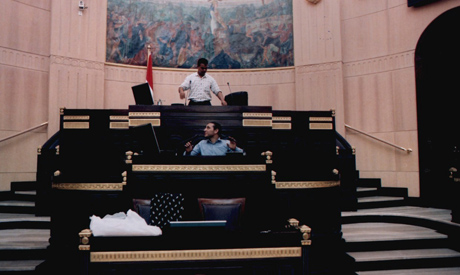
Preparations are underway at the Senate
The 300-member Senate will meet on Sunday to discuss the 293 articles of internal bylaws that will regulate proceedings in Egypt’s second house, Senate Secretary-General Mahmoud Ismail Othman told reporters this week.
According to Othman the bylaws include provisions for 14 committees: constitutional and legislative affairs; foreign, arabic and african affairs; defence and national security; human rights; social solidarity; financial, economic and investment affairs; industry and trade; energy, environment and manpower; housing, local administration and transport; education, youth and sports; health and population; agriculture and irrigation; culture, media, tourism and antiquities; and religious and waqf, as well as an ethics committee headed by one of the Senate speaker’s two deputies, and including the heads of each of the 14 committees together with four additional members, one of whom must belong to an opposition party. According to Article 38 of the bylaws, additional committees can be created when the need arises.
The opening articles of the bylaws define the role of the Senate and are clear in indicating that, unlike the House of Representatives, the second chamber does not have legislative powers.
“By this we mean that unlike MPs at the first chamber members of the Senate can’t propose or draft laws,” said Ismail.
Senate members are, however, required to give their views on any constitutional amendments, the government’s annual economic development plan, changes to any alliances and international treaties, and draft legislation referred by the president or the House of Representatives.
“The Senate is mainly an advisory body,” says political analyst and Senate member Abdel-Moneim Said. “It will operate like a political think tank for the president and the House of Representatives, offering advice that, in line with Article 248 of the constitution, reinforces the three pillars of democracy - elections, political parties, and civil society organisations.”
“Senate members are also required to uphold the principles of political competitiveness, mutual acceptance and equality, work to support the principles of citizenship, social justice, freedom of expression, and fight discrimination, organised crime, terrorism, tribal conflicts and sectarian strife.”
The ad hoc committee which took charge of drafting the Senate’s internal bylaws included 30 members. “It was headed by Speaker of the Senate Abdel-Wahab Abdel-Razek and his two deputies, Phoebe Fawzi and Bahaaeddin Abu Shoka,” said Ismail.
The bylaws state that the speaker and/or deputy speakers can be dismissed if they lose the confidence of a third of Senate members, while Article 14 sets the maximum period in office for the speaker and his deputies at two legislative terms, each spanning five years.
Articles 107-119 of the Senate’s Internal bylaws describe the supervisory powers members will exercise. They include directing questions that must be answered by cabinet ministers, holding debates on government policy, and submitting proposals to the prime minister.
Articles 225-229 accord Senate members full parliamentary immunity and stipulate that legal measures against members can only be taken with the Senate’s approval except in exceptional circumstances outlined in Article 225.
Though discussions of the Senate’s internal bylaws could spill into a number of meetings Ismail expects the bylaws to be approvedsooner rather than later. “Once approved, they will be referred to the president and the cabinet who in turn will refer the bylaws to the House of Representatives so they can be enacted into law.”
*A version of this article appears in print in the 26 November, 2020 edition of Al-Ahram Weekly
Short link: